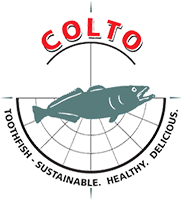The inaugural COLTO industry and science workshop successfully concluded in Alesund, Norway with a unique pathway agreed to enhance collaboration and innovation between fishers, scientists, gear technologists, and marketers.
Participants from 12 nations put aside any competitive and professional differences, and created a world-leading partnership on international fisheries resources management and conservation.
“The results were astounding”, said the Chair of COLTO, Martin Exel. “The power of the meeting was evident throughout, with everyone working together to improve global scientific and industry knowledge, including understandings of toothfish specifically, and the environment and ecologically related species that they exist with.”
Three working groups were created to seek solutions on:
- Killer whale and sperm whale depredation in toothfish fisheries
To oversee an international workshop on depredation to reduce opportunity for whales to feed on toothfish being caught on longlines. The workshop will look into standardising data collection on this issue, as well as development of technological innovations to be developed by the industry, scientists and technologists, with the ultimate aim of identifying ways to avoid feeding whales with caught toothfish;
- International scientific collaborative program development
In the first instance, to identify a program of oceanographic baseline data collection to help scientific understanding of the impacts of warming sea water temperatures and ice-melt in the Antarctic region. And further, to recommend programs for broad international science delivery across the southern oceans.
The initial program will involve technological advancements to longlines, by integrating deep water data loggers into fishing gear to gather oceanographic information such as temperature and salinity, to allow real time monitoring of climate change impacts in the Antarctic regions.
- Public education and marketing information on toothfish, and the fisheries
This group will utilise the extensive scientific work that continues in toothfish fisheries, and focus on clarification of issues on toothfish for the general public in a structured, understandable way.
The common theme across all of the working groups was the formation of a Toothfish Fisheries Collaborative Partnership between COLTO members and scientists involved in toothfish fisheries globally to ensure sustainability.
Martin congratulated all participants for their dedication and efforts in devising this uniquely global fisheries program. He also praised the contribution and support of two major gear technology companies who sponsored the event, Mustad Autoline AS and AS Fiskevegn, who facilitated the workshop to improve scientific, ecological, environmental and industry-based aspects of toothfish fisheries.
A detailed report will be provided to the international Commission for the Conservation of Antarctic Marine Living Resources (CCAMLR), which oversights the conservation and rational use of many toothfish fisheries, as well as to National governments where fisheries are outside CCAMLR waters.
More information:
Contacts:
Mustad Autoline: Anders Frisinger +47 9597 2206
Fiskevegn: Trond-Inge Kvernevik +47 9516 0503
COLTO: Martin Exel +61 413 595 532
Participants included COLTO members and scientists from:
Australia
Chile
Falkland Islands (Malvinas)
France
Korea
New Zealand
South Africa
Spain
Netherlands
Norway
United Kingdom
USA
COLTO:
COLTO represents fishing operators who catch over 90% of the global catch of toothfish, along with supporters such as fishing gear manufacturers, fish traders, and retailers. They are strong supporters of sustainable, legal management of toothfish fisheries and work closely with governments, conservation groups, scientists and CCAMLR to ensure that toothfish stocks are healthy and sustainable. Members come from Argentina, Australia, Chile, France, Japan, Korea, New Zealand, Norway, South Africa, Spain, UK, and the USA.
See www.colto.org
